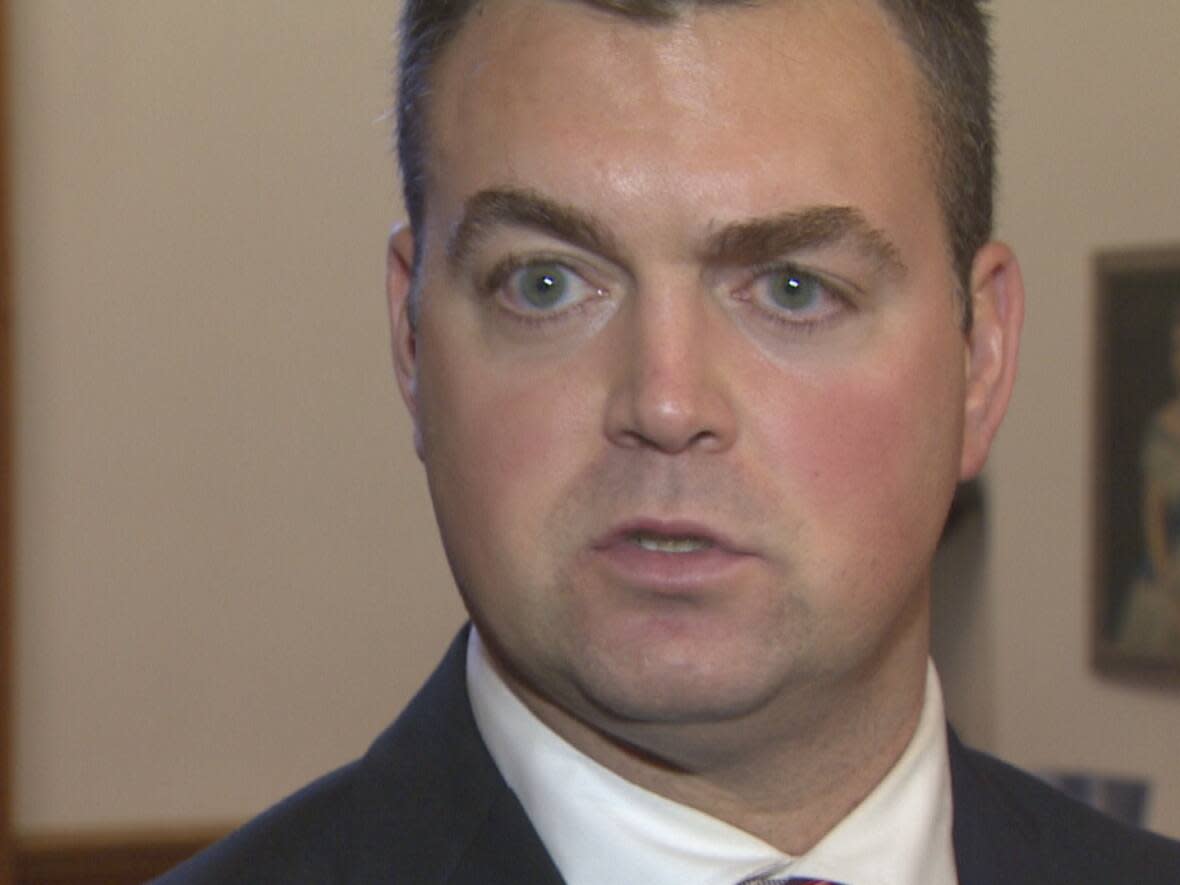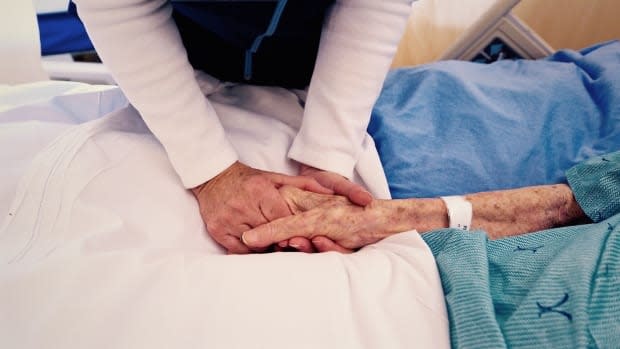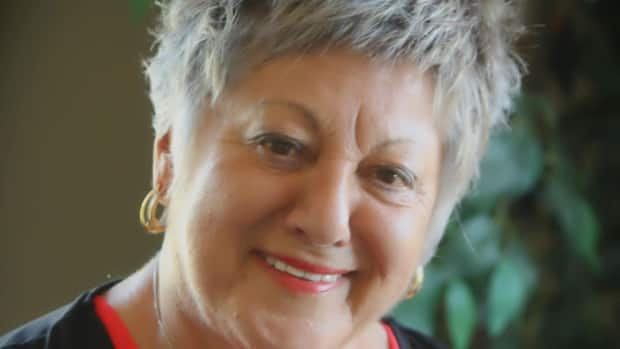Opposition calls for public update on respiratory viruses in advance of holiday gatherings

Liberal MLAs are calling on the Higgs government to hold a public update on the spread of respiratory illnesses in New Brunswick, the state of health care, and what people can do to protect themselves and their families in advance of holiday gatherings.
"Right now everyone has friends, family members or colleagues who are uncommonly sick and we all know our hospital system isn't in a position to serve them," Rob McKee, leader of the Official Opposition and health critic, said in a statement Tuesday.
"People need to hear directly from the government about what is being done to support the health-care system and sick New Brunswickers right now," he said.
This is the second time the Liberals have called for a public health briefing in the past couple of weeks.
The latest statement comes as New Brunswick reported six more deaths from COVID-19 in the past week.
Forty people are hospitalized because of the virus, according to the province's weekly COVIDWatch report, while Horizon and Vitlité, which count people admitted to hospital because of COVID-19, as well as those initially admitted for another reason who later test positive for the virus, say they have 102 COVID patients, including three in intensive care.
Flu deaths and hospitalizations have already surpassed last year's seasonal totals. the province's influenza reports show. Nine New Brunswickers have died from the flu in the past two months and 120 have been hospitalized, compared to five and 92 respectively.

And respiratory syncytial virus, or RSV, infections are up at least 800 per cent in New Brunswick, compared to last year. Forty-five New Brunswickers had tested positive for RSV, as of Nov. 12, compared to five, based on data from the Dr. Georges-L.-Dumont University Hospital Centre laboratory in Moncton alone.
The triple threat of respiratory viruses is also affecting the education system, with student absenteeism up overall across the province in October, compared to the previous three years, and one Sackville school reporting 100 students absent one day last week.
People aren't feeling very merry and bright about what the new year will bring for our province. - Susan Holt, Liberal leader
Francophone south school district has had to cancel at least nine classes so far because of a higher than usual absence rate among teachers and a shortage of supply teachers, and the shortage of teachers and supply teachers in anglophone schools because of illness and other absences has reached "a crisis point," according to the head of the New Brunswick Teachers' Association.
"We're seeing far too many kids and teachers out sick falling further behind in school and far too many front-line workers sick increasing pressures on our already short-staffed hospitals," said Liberal Leader Susan Holt.
"People aren't feeling very merry and bright about what the new year will bring for our province."

With holiday gatherings just weeks away, people need "transparent, open data" on the various viruses so they can make the best possible decisions about how to protect their families while still being able to celebrate, she said.
"The government and Public Health need to show some leadership right now by speaking directly to New Brunswickers through a public, livestreamed press conference followed by questions from the media."
Change in testing expected to contribute to rise in numbers
The Department of Health did not respond to a request for comments on the statement from the Liberals.
But in an email, department spokesperson Adam Bowie pointed out that Dr. Yves Léger, the acting chief medical officer of health, did note during a media availability Nov. 18 the influenza season arrived "earlier, and in greater intensity" this year than in recent years.
"And, in combination with COVID-19 and RSV, we're seeing lots of activity so far in this respiratory illness season," Bowie said.
"And we expect those numbers to continue to rise."
A recent change in lab testing is expected to contribute to that, said Bowie.
"Over the course of the COVID-19 pandemic, efforts have been made to improve the testing turnaround times for various communicable diseases — like COVID, but also RSV and influenza," he said.
"One change has allowed regional laboratories to run rapid diagnostic testing for some respiratory illnesses locally."

They're not rapid tests like the COVID rapid tests people do themselves at home, Bowie clarified. They're still PCR (polymerase chain reaction) lab-confirmed tests, but the results are processed more rapidly than before.
This means the Dr. Georges-L.-Dumont University Hospital Centre laboratory in Moncton, which is the Public Health Agency of Canada's sentinel site for the province, has more time to collect and include the regional results in its data for the provincial FluWatch reports and national monitoring, said Bowie.
Until now, data has come only from the Dumont lab results, he said.
"We should see those results in our next reporting cycle."
Numbers under-reported
Bowie acknowledged that even those will be far lower than the true number of cases, since most people don't get tested for the flu. They simply stay home.
"There's never a way to capture every single case of influenza in any jurisdiction, but the information is still helpful."
It's part of the province's communicable disease surveillance, he said, and helps the department better understand the viruses spreading.
"When people are tested for COVID (because they have flu-like symptoms), or for a bad case of flu or RSV, etc., those results are captured in the testing process, and shared through our provincial FluWatch and COVIDWATCH reports, and through the data provided to PHAC."

Asked to comment on the latest flu data, Bowie said influenza kills "a number" of New Brunswickers each year — "often the very young or the very old, or our most vulnerable citizens with chronic illnesses.
"This year is no different."
The department encourages New Brunswickers to take steps to reduce their risks, including those six months or older getting the free vaccine, and everyone applying protective measures, such as staying home when sick or experiencing flu-like symptoms; wearing a mask when in crowded, public places; practising physical distancing; limiting the number of unnecessary contacts, and hand washing after sneezing or coughing.
Promote high-dose vaccine for seniors
Cecile Cassista, executive director of the Coalition for Seniors and Nursing Home Residents' Rights, is calling on the province to raise awareness about the high-dose flu vaccine available free of charge to those aged 65 or older, and to make it more easily accessible.
The high-dose vaccine is intended to give seniors a stronger immune response, and better protection against influenza.
Cassista contends New Brunswick has the best high-dose influenza vaccine program for the 65-plus population in the country, but it's not widely known.
"We would like to see this program promoted to get the message out," she wrote in a recent email to Health Minister Bruce Fitch. "We need to ensure the elderly are protected."

Even Fitch incorrectly stated in his response that the high-dose vaccine is available to residents aged 65 or older "in long-term care facilities, including nursing homes and special care homes," Cassista noted.
She promptly replied to the health minister, correcting him that unlike Nova Scotia, Newfoundland and Labrador, Quebec and B.C., where the high-dose vaccine is provided only to those 65 or older in long-term care homes, it's available in New Brunswick to everyone in that age group, regardless of where they live.
Cassista also raised concerns that a growing number of pharmacies providing the shots require people to book appointments online, or by calling a 1-800 number, instead of accepting walk-ins.
"Many [seniors] don't have access to today's technology," while those trying to call get frustrated by the long waits, she wrote.
"Some have shared they can't be bothered. This is concerning."
In a separate email to the acting chief medical officer of health, she stressed this vulnerable group needed to be protected. As of Tuesday, Léger had not responded, she said.
Outreach planned in 'coming weeks'
But Fitch, in his Nov. 17 response, told Cassista, "there are more traditional communication and stakeholder outreach methods planned to communicate the availability of the high-dose flu vaccine in the coming weeks."
This will include engaging with partners, such as Cassista's group and other health-provider agencies specifically concerned with seniors' health, he said.
"Public Health New Brunswick is also engaging with their partners within pharmacies and physician offices to make sure the message is getting out directly to patients," Fitch said.


